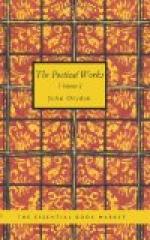And if they cursed the king when he was
by,
Would rather curse than break good company.
If any durst his factious friends accuse,
He pack’d a jury of dissenting Jews;
Whose fellow-feeling in the godly cause
Would free the suffering saint from human laws.
For laws are only made to punish those 610
Who serve the king, and to protect his foes.
If any leisure time he had from power
(Because ’tis sin to misemploy an hour),
His business was, by writing to persuade,
That kings were useless and a clog to trade;
And, that his noble style he might refine,
No Rechabite more shunn’d the fumes of wind.
Chaste were his cellars, and his shrivel board
The grossness of a city feast abhorr’d;
His cooks with long disuse their trade forgot; 620
Cool was his kitchen, though his brains were hot.
Such frugal virtue malice may accuse,
But sure ’twas necessary to the Jews;
For towns, once burnt, such magistrates require
As dare not tempt God’s providence by fire.
With spiritual food he fed his servants well,
But free from flesh that made the Jews rebel:
And Moses’ laws he held in more account,
For forty days of fasting in the mount.
To speak the rest who better are forgot, 630
Would tire a well-breathed witness of the plot.
Yet Corah, thou shalt from oblivion pass;
Erect thyself, thou monumental brass,
High as the serpent of thy metal made,
While nations stand secure beneath thy shade.
What though his birth were base, yet comets rise
From earthly vapours, ere they shine in skies.
Prodigious actions may as well be done
By weaver’s issue, as by prince’s son.
This arch attestor for the public good 640
By that one deed ennobles all his blood.
Who ever ask’d the witness’s high race,
Whose oath with martyrdom did Stephen grace?
Ours was a Levite, and as times went then,
His tribe were God Almighty’s gentlemen.
Sunk were his eyes, his voice was harsh and loud,
Sure signs he neither choleric was, nor proud.
His long chin proved his wit; his saint-like grace
A church vermilion, and a Moses’ face.
His memory miraculously great, 650
Could plots, exceeding man’s belief, repeat;
Which therefore cannot be accounted lies,
For human wit could never such devise.
Some future truths are mingled in his book;
But where the witness fail’d, the prophet spoke.
Some things like visionary flights appear;
The spirit caught him up the Lord knows where;
And gave him his rabbinical degree,
Unknown to foreign university.
His judgment yet his memory did excel; 660
Which pieced his wondrous evidence so
Would rather curse than break good company.
If any durst his factious friends accuse,
He pack’d a jury of dissenting Jews;
Whose fellow-feeling in the godly cause
Would free the suffering saint from human laws.
For laws are only made to punish those 610
Who serve the king, and to protect his foes.
If any leisure time he had from power
(Because ’tis sin to misemploy an hour),
His business was, by writing to persuade,
That kings were useless and a clog to trade;
And, that his noble style he might refine,
No Rechabite more shunn’d the fumes of wind.
Chaste were his cellars, and his shrivel board
The grossness of a city feast abhorr’d;
His cooks with long disuse their trade forgot; 620
Cool was his kitchen, though his brains were hot.
Such frugal virtue malice may accuse,
But sure ’twas necessary to the Jews;
For towns, once burnt, such magistrates require
As dare not tempt God’s providence by fire.
With spiritual food he fed his servants well,
But free from flesh that made the Jews rebel:
And Moses’ laws he held in more account,
For forty days of fasting in the mount.
To speak the rest who better are forgot, 630
Would tire a well-breathed witness of the plot.
Yet Corah, thou shalt from oblivion pass;
Erect thyself, thou monumental brass,
High as the serpent of thy metal made,
While nations stand secure beneath thy shade.
What though his birth were base, yet comets rise
From earthly vapours, ere they shine in skies.
Prodigious actions may as well be done
By weaver’s issue, as by prince’s son.
This arch attestor for the public good 640
By that one deed ennobles all his blood.
Who ever ask’d the witness’s high race,
Whose oath with martyrdom did Stephen grace?
Ours was a Levite, and as times went then,
His tribe were God Almighty’s gentlemen.
Sunk were his eyes, his voice was harsh and loud,
Sure signs he neither choleric was, nor proud.
His long chin proved his wit; his saint-like grace
A church vermilion, and a Moses’ face.
His memory miraculously great, 650
Could plots, exceeding man’s belief, repeat;
Which therefore cannot be accounted lies,
For human wit could never such devise.
Some future truths are mingled in his book;
But where the witness fail’d, the prophet spoke.
Some things like visionary flights appear;
The spirit caught him up the Lord knows where;
And gave him his rabbinical degree,
Unknown to foreign university.
His judgment yet his memory did excel; 660
Which pieced his wondrous evidence so




